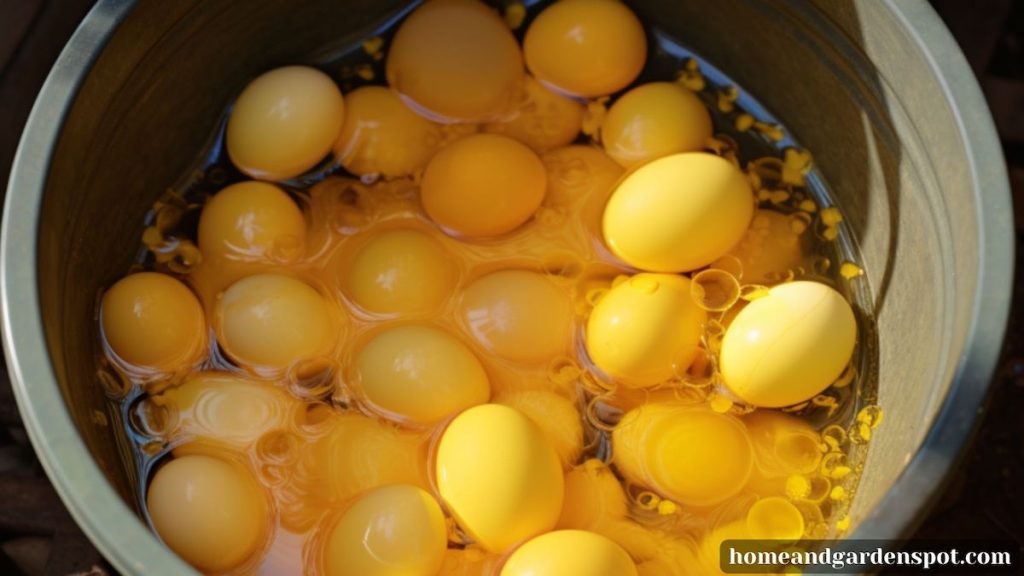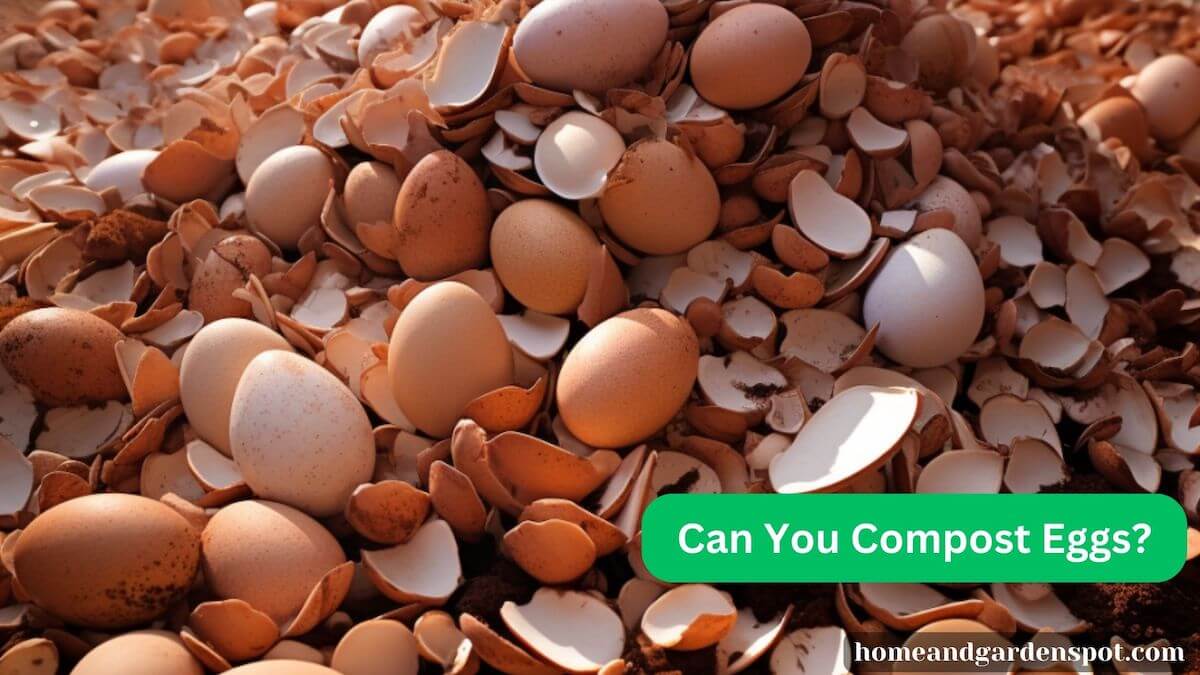Composting is a natural process that involves breaking down organic waste into nutrient-rich soil that can be used to grow plants.
It’s an eco-friendly way of disposing of food scraps and other organic materials. One common question that arises when it comes to composting is whether eggs can be composted or not.
Eggs are a common household item that can be found in most kitchens. They are a great source of protein and are used in many recipes. However, can you compost eggs?
Yes, you can compost eggs, although, in my experience, using only eggshells is best.
Eggshells are rich in calcium and other beneficial minerals for plant growth. When added to compost, eggshells help to balance the pH level of the soil and improve its structure.
Whole raw or cooked eggs should not be added to most backyard compost bins because they could attract pests and rodents and stink like rotten eggs.
Nonetheless, you can still compost your cooked or raw eggs using the right composting methods that I’ll be discussing in this blog post.
How to Compost Cooked and Raw Eggs
1. Hot Composting Method
Hot composting involves creating a compost pile that generates high temperatures, accelerating decomposition. This is a great method for composting eggs, especially if you have more to dispose of.
Process:
- Start your compost pile with a mix of high-carbon (brown) materials like leaves, corn cobs, straw, shredded paper, and high-nitrogen (green) materials like fruit and vegetable scraps, coffee grounds, and eggshells.
- Place raw and cooked eggs at the center of the pile. This will help contain any potential odors and break down the eggs more efficiently.
- Make sure the pile is well-aerated by turning it regularly to maintain high temperatures. Aim for temperatures between 130-140°F (54.5-60°C) to break down eggs and other organic matter effectively.
- Monitor the moisture levels; the pile should be moist but not soggy.
2. Cold Composting Method
Cold composting involves allowing organic materials to decompose naturally over time. While this method is slower than hot composting, it’s still suitable for composting small amounts of eggs.
Process:
- In a cold compost pile, bury raw or cooked eggs at least a foot deep in the center of the heap. This helps prevent animals from being attracted to the eggs.
- Cover the compost pile with a heavy material or a lid to deter animals from digging.
3. Bokashi Composting
Bokashi composting is a fermentation process that allows you to compost all food waste, including cooked and raw eggs. I’ll recommend this method if you have very limited space.
Process:
- Collect your food waste, including eggs, in a Bokashi bin layered with Bokashi bran, which contains beneficial microorganisms that ferment the waste.
- Once the bin is full, seal it and allow the fermentation process to occur over a few weeks.
- The fermented waste breaks down into a nutrient-rich sludge. You can bury this sludge in your garden soil or compost it in a regular compost pile.
Tips for Composting Cooked or Raw Eggs
1. If you’re using an open compost pile, covering it with sheet metal, heavy boards, or a wire mesh screen will help keep scavengers away.
2. Burying eggs deep in the pile minimizes odor and prevents animals from being attracted.
3. Balancing your compost with carbon-rich and nitrogen-rich materials helps mitigate odor issues.
4. Avoid adding large quantities of eggs at once; instead, incorporate them gradually into the compost to prevent overwhelming the system.
Are Eggs Green or Brown Materials?
Egg yolks and egg whites are considered “green” materials in composting. Green materials are nitrogen-rich and include items like fruit and vegetable scraps, coffee grounds, and grass clippings.
These materials provide the nitrogen necessary to help break down the carbon-rich “brown” materials, like leaves, straw, and paper.
Eggshells, on the other hand, are not categorized as either brown or green materials. A greater percentage of eggshells contain calcium carbonate.
While they don’t contribute significant nitrogen or carbon to the compost, they are valuable additions for other reasons. They equally contain magnesium, phosphorus, and potassium which are essential plant nutrients.
Adding crushed eggshells to your compost can help improve soil structure and prevent issues like soil acidity.
How to Compost Eggshells
1. Wash the Eggshells
Before composting eggshells, it’s recommended to wash them to remove any potential contaminants. Washing helps prevent the transfer of bacteria, like Salmonella, to the soil.
2. Dry the Eggshells
After washing, allow the eggshells to dry thoroughly. Dry shells will decompose more quickly in the compost pile.
3. Crush or Grind the Eggshells
Crushing or grinding eggshells into smaller pieces increases their surface area and speeds up decomposition.
You can use a food processor to turn them into a fine powder, making them easier to incorporate into the compost.
4. Layering in the Compost Pile
Composting eggshells involves layering them with other organic waste to create a balanced compost mixture. Aim for a good mix of green (nitrogen-rich) and brown (carbon-rich) materials.
5. Create a Compost Mixture
Layer the finely crushed eggshells with other compostable materials like vegetable scraps, coffee grounds, leaves, and grass clippings. The combination of different materials contributes to a well-balanced compost.
6. Monitor Moisture and Aeration
Maintain the right moisture level in your compost pile. It should be moist but not overly wet. Regularly turn or aerate the pile to ensure proper decomposition and prevent foul odors.
7. Finished Compost (The End Result)
Once your composting process is complete and the materials have broken down, you’ll have a rich, dark compost. It should be crumbly and have no lingering odors or excessive heat. This compost is now ready to use.
8. Apply the Compost
Use the finished compost as a nutrient-rich soil amendment. You can spread a thin layer of the compost on your garden beds, around plants, or when planting new plants. It helps improve soil structure, adds nutrients, and enhances overall soil health.
Can You Compost Egg Yolk?
Yes, you can compost egg yolks. However, using the right composting method such as a bokashi bin or managed hot compost bin is generally recommended.
Whole raw or cooked eggs should not be added to most backyard compost bins because they could attract pests and rodents, as well as stink like rotten eggs.
If you want to compost egg yolks, it is best to use only the yolks and not the whites. The yolks are rich in nutrients such as protein, fat, and vitamins A and D. When added to compost, they help to enrich the soil and improve its structure.

How Long Do Eggshells Take to Compost?
Eggshells can take up to one year to decompose. However, it can compost at different rates depending on how they are prepared and the conditions of your composting environment. Here’s a breakdown of the approximate timeframes for different scenarios:
1. Fine Dust or Powdered Eggshells
If you grind eggshells into a fine dust or powder, they can decompose relatively quickly. Within a few months, the powdered eggshells will integrate with the other compost materials and contribute calcium and other nutrients to the soil.
2. Small Fragments or Crushed Eggshells
When you crush eggshells into small fragments, they decompose faster than whole eggshells. It might take around one year for crushed eggshells to break down and become part of the compost mixture.
3. Whole or Larger Eggshell Pieces
If you add whole or larger eggshell pieces to your compost pile, the decomposition process will be slower. It could take several years for whole eggshells to break down in the compost fully.
During this time, they might remain recognizable in the compost, but they will gradually release calcium and other minerals into the soil.
Conclusion
Composting eggs can be straightforward with the right approach. Both raw and cooked eggs can find a place in your compost pile by following a few key steps.
Begin by incorporating small eggs, such as scrambled or leftover fried eggs, and other kitchen waste, like vegetable scraps and coffee grounds.
Balancing carbon-rich and nitrogen-rich materials ensures efficient decomposition without disrupting the composting process.
Also, consider different composting methods like closed systems or Bokashi composting to suit your preferences and space.
Finally, eggshells are the most valuable part of an egg suitable for composting. They provide a long-lasting source of calcium to enrich your compost.

Leave a Reply